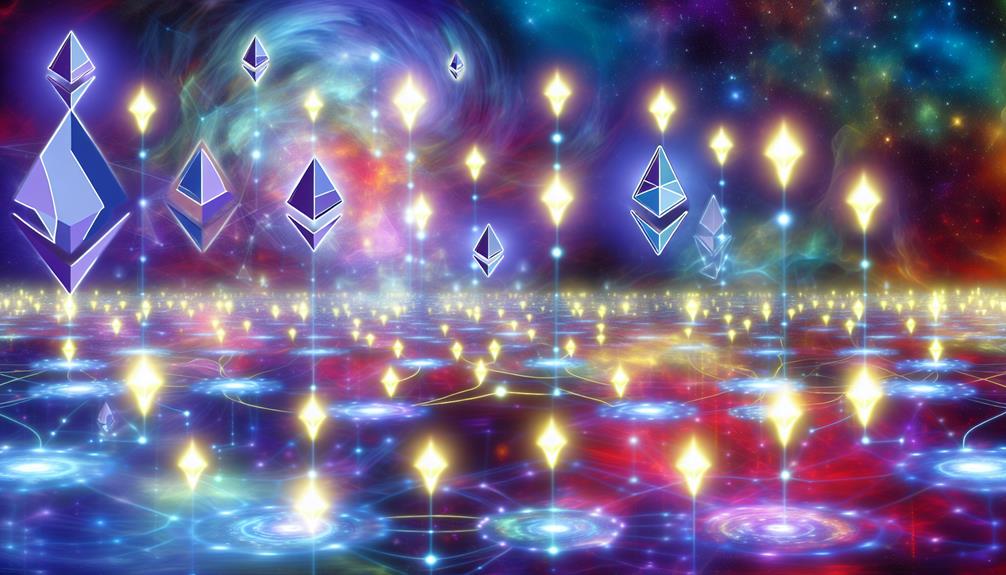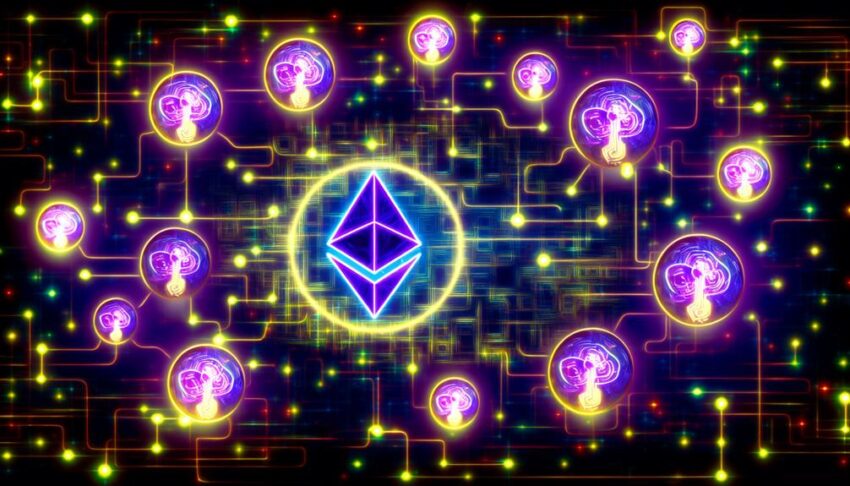When you think about blockchain technology, Ethereum often comes to mind as more than just a cryptocurrency. Launched in 2015, it's a decentralized platform that enables the creation of smart contracts and decentralized applications, commonly referred to as dApps. But how exactly does it work, and what sets it apart from other blockchain platforms? Understanding these aspects can open up a whole new perspective on its impact across various industries. You might be surprised by the intricate layers that make Ethereum a cornerstone of today's digital economy.
Overview of Ethereum

Although many people associate Ethereum primarily with cryptocurrency, it's actually a robust decentralized platform that enables developers to build and deploy smart contracts and decentralized applications (dApps). Since its inception in 2015, Ethereum has evolved considerably, shaped by its rich history and an active community. This community drives innovation, fostering a collaborative environment that encourages contributions to the Ethereum ecosystem.
One of the important concerns for Ethereum is scalability. As more users join the network, the demand for efficient transaction processing increases. To address this, developers are implementing various upgrades, such as Ethereum 2.0, which aims to enhance scalability and security. These upgrades are essential for adapting to growing user needs and maintaining the network's integrity.
Ethereum's security features are also critical. The platform employs a consensus mechanism to validate transactions and prevent fraudulent activities. This guarantees a secure environment for dApps and smart contracts, promoting trust among users. Additionally, governance plays a notable role in Ethereum's evolution. The community actively participates in decision-making processes that shape the platform's future.
Interoperability is another factor driving Ethereum's adoption. The ability to interact with other blockchain networks enhances its utility, making it a preferred choice for developers. As Ethereum continues to grow, its scalability, security, and governance will determine its long-term success and position within the broader blockchain landscape. Overall, understanding Ethereum's multifaceted nature is important for grasping its potential impact on the future of decentralized technologies.
How Ethereum Works
Ethereum operates as a decentralized platform, leveraging blockchain technology to enable smart contracts and decentralized applications (dApps). At its core, Ethereum uses consensus mechanisms, such as Proof of Stake, to guarantee that all transactions are verified and recorded securely. This approach not only enhances Ethereum network security but also contributes to the platform's overall scalability solutions, allowing it to handle more transactions efficiently.
As you navigate the Ethereum ecosystem, you'll notice the significance of Ethereum token standards like ERC-20 and ERC-721. These standards facilitate the creation and exchange of tokens, driving innovation across various sectors, including finance, gaming, and art. The flexibility of these standards is a key reason behind Ethereum's ecosystem growth, attracting developers to build new dApps and services.
Community governance plays a crucial role in Ethereum's evolution. Through proposals and voting, the Ethereum community influences upgrades and changes, guaranteeing that the platform adapts to market trends and user needs. This democratic approach fosters a sense of ownership among users and developers alike.
Moreover, the availability of robust Ethereum development tools simplifies the process of creating and deploying dApps. As you explore these tools, you'll find that they empower not just experienced developers but also newcomers to engage with blockchain technology.
Key Features of Ethereum

When exploring Ethereum, you can't overlook its groundbreaking features like smart contracts and decentralized applications (dApps). These elements not only enhance functionality but also redefine how transactions and interactions occur on the platform. Understanding these key aspects will give you a clearer picture of Ethereum's potential and versatility in the blockchain landscape.
Smart Contracts Explained
At the heart of Ethereum's innovative platform lies the concept of smart contracts, which are self-executing agreements with the terms directly written into code. These contracts enable automated transactions, reducing the need for intermediaries and streamlining processes. However, you should be aware of various aspects that impact their effectiveness and security.
- Smart Contract Security: Ensuring your contracts are secure is essential to prevent vulnerabilities.
- Contract Auditing: Regular audits can help identify potential issues before deployment.
- Gas Fees: Understanding gas fees is important, as they can vary based on network congestion.
As you explore smart contracts, consider their legal implications, especially in different jurisdictions. You'll also encounter scalability solutions that aim to enhance Ethereum's capacity to handle more transactions. Additionally, be prepared to face interoperability challenges when integrating with other blockchain networks. Utilizing robust development frameworks can aid in crafting efficient smart contracts while addressing these concerns. Ultimately, smart contracts represent a transformative technology that has the potential to reshape industries and redefine how agreements are executed.
Decentralized Applications (dApps)
How do decentralized applications, or dApps, revolutionize the way we interact with technology and services? dApps operate on blockchain networks like Ethereum, enabling transparent, secure, and immutable interactions without the need for central authority. This architecture fundamentally enhances dapp development, allowing you to create applications that are resistant to censorship and downtime.
In terms of governance, dApps often utilize decentralized models, where users can vote on key changes, fostering a sense of community ownership. Popular dapp examples include Uniswap for decentralized finance and Cryptokitties for digital collectibles, showcasing the versatility of this technology.
When it comes to monetization, dApps can generate revenue through transaction fees or token sales, creating sustainable business models. However, dapp security remains a primary concern; vulnerabilities can lead to significant losses. Therefore, developers must prioritize robust security measures during the development process.
Lastly, dapp scalability is essential for mass adoption. As user demand grows, ensuring that your application can handle increased activity without compromising performance is important. Overall, dApps are reshaping the digital landscape, offering innovative solutions and opportunities for users and developers alike.
Smart Contracts Explained
Smart contracts are self-executing agreements with the terms directly written into code, and they play a vital role in the Ethereum ecosystem. You'll find that they function autonomously on the blockchain, executing transactions when predetermined conditions are met. This technology not only enhances efficiency but also opens up a wide range of benefits and use cases across various industries.
Definition of Smart Contracts
In the world of blockchain technology, smart contracts have emerged as a revolutionary tool that automates and enforces agreements without the need for intermediaries. These self-executing contracts operate on platforms like Ethereum, leveraging coding languages to define the terms and conditions. By eliminating middlemen, you can reduce transaction fees and enhance efficiency.
However, smart contracts aren't without their challenges. Security challenges can arise, necessitating thorough smart contract auditing to identify vulnerabilities. Additionally, the legal implications of these contracts can be complex, as jurisdictions may differ in recognizing their validity.
Here are some key aspects to take into account:
- Ethereum Governance: The decentralized nature allows for community-driven decisions about upgrades.
- Blockchain Scalability: As usage grows, ensuring the network can handle increased demand is essential.
- Upgrade Mechanisms: Smart contracts may need to evolve, requiring well-defined mechanisms to implement changes without disruption.
How They Function
With their ability to automate agreements, smart contracts function as programmable scripts that execute predefined actions when specific conditions are met. You're fundamentally able to create a set of rules encoded into the Ethereum blockchain, guaranteeing that once conditions are satisfied, actions occur automatically without the need for intermediaries. This automation not only enhances efficiency but also reduces the risk of human error.
Smart contracts are essential in addressing Ethereum scalability solutions. As the network grows, these contracts can be optimized to handle increased demand, enabling faster transaction processing. By employing various scalability techniques, such as layer-2 solutions or sharding, you can help guarantee that smart contracts remain effective, even as user interactions multiply.
Moreover, the design of Ethereum governance models influences how smart contracts evolve. Community consensus plays a significant role in determining how these contracts function and adapt over time. By engaging in governance discussions, you contribute to shaping the landscape of smart contracts, guaranteeing they remain relevant and effective in meeting user needs. Ultimately, this interplay between smart contracts, scalability, and governance defines the future of decentralized applications on the Ethereum platform.
Benefits and Use Cases
One of the most compelling aspects of Ethereum's smart contracts is their ability to revolutionize various industries through automation and trustless transactions. By leveraging these self-executing contracts, you can streamline processes and reduce the need for intermediaries, which can lead to significant cost savings.
Here are a few key benefits and use cases:
- DeFi Innovations: Smart contracts enable decentralized finance solutions, allowing for peer-to-peer lending, borrowing, and trading without traditional banks.
- NFT Marketplace: Ethereum's token standards, like ERC-721, facilitate the creation and trading of non-fungible tokens, revealing new opportunities in art, gaming, and collectibles.
- Community Governance: Smart contracts can empower decentralized autonomous organizations (DAOs), where holders can vote on decisions, ensuring community-driven governance.
Moreover, scalability solutions are continuously being developed to enhance transaction speed and efficiency. With robust security protocols, users can trust that their assets are protected. As industries explore these applications, Ethereum's smart contracts are set to reshape how we think about transactions and interactions in a digital landscape.
Decentralized Applications (dApps)

Decentralized applications, or dApps, represent a significant shift in how software can operate, as they leverage blockchain technology to provide transparency, security, and user empowerment. Unlike traditional applications, dApps aren't controlled by a single entity, which enhances user experience through decentralized finance (DeFi) and community governance. In the world of dApp development, you'll find various applications spanning different sectors, including gaming applications and NFT platforms.
To give you a better overview, here's a concise comparison of key aspects of dApps:
| Aspect | Details |
|---|---|
| User Adoption | Rapidly growing due to unique offerings and peer-to-peer functionalities. |
| Security Challenges | Vulnerabilities exist, yet blockchain technology enhances overall security. |
| Scalability Solutions | Ongoing research is focused on improving transaction speeds and costs. |
| Interoperability Issues | Connecting multiple blockchains remains a challenge for seamless usage. |
As you explore dApps, it's crucial to understand that while they offer promising solutions, they also face hurdles such as security challenges and interoperability issues. Their success hinges on the balance between innovative user experiences and overcoming these obstacles. By embracing these decentralized platforms, you're not just joining a tech trend; you're participating in a movement that prioritizes user empowerment and community engagement. As dApps evolve, they'll likely redefine conventional software landscapes, making your involvement all the more significant.
Ethereum's Impact on Industries
The rise of decentralized applications (dApps) has set the stage for Ethereum to markedly impact various industries. You might be surprised to learn how Ethereum adoption is driving industry transformation across sectors. With its robust smart contract capabilities, Ethereum fosters financial innovation, reshaping how transactions occur in the finance world and beyond.
Consider these key areas where Ethereum is making waves:
- Supply Chain: By providing transparent tracking and verification, Ethereum enhances efficiency and trust in supply chains.
- Gaming Revolution: Blockchain-enabled games allow players to truly own their in-game assets, creating new economic models and player engagement strategies.
- Healthcare Solutions: Ethereum facilitates secure, decentralized patient records, leading to improved data management and enhanced privacy.
In real estate, Ethereum is streamlining property transactions through tokenization, making it easier for buyers and sellers to engage without intermediaries. Additionally, the platform is revolutionizing digital identity management, allowing individuals to control their personal data securely.
Energy management is another area benefiting from Ethereum, as smart contracts can optimize energy distribution and consumption. Finally, the social impact of Ethereum is profound, providing tools for communities to create decentralized finance (DeFi) solutions that empower underserved populations.
As you can see, Ethereum isn't just a cryptocurrency; it's a catalyst for change across various industries, driving innovation that enhances efficiency, security, and accessibility.
Frequently Asked Questions
How Is Ethereum Different From Bitcoin?
Ethereum's scalability sets it apart from Bitcoin. While Bitcoin focuses on transactions, Ethereum enables smart contracts, allowing developers to create decentralized applications. This flexibility opens new opportunities for innovation and broader use cases beyond currency.
What Is the Role of Miners in Ethereum?
Imagine miners as diligent gardeners, nurturing Ethereum's blockchain. They validate blocks through a consensus mechanism, process transactions, guarantee network security, and reap mining rewards, all while keeping the ecosystem thriving and flourishing with activity.
Can Ethereum Be Used for Traditional Banking?
You can leverage Ethereum for traditional banking through decentralized finance and smart contracts, fostering bank integration. This approach promotes financial inclusivity, enabling broader access to financial services while reducing reliance on conventional banking systems.
What Are Ethereum Tokens and How Do They Differ?
Ethereum tokens represent digital assets on the Ethereum blockchain, differing in token standards like ERC-20 and ERC-721. Their utility varies, influencing token economics, which shapes how they're used in decentralized applications and ecosystems.
Is Ethereum Environmentally Friendly or Sustainable?
Did you know Ethereum's shift to proof-of-stake reduced its energy consumption by over 99%? This move enhances Ethereum's sustainability, showcasing a commitment to eco-friendly practices and minimizing environmental impact through improved blockchain efficiency and renewable energy use.
Conclusion
In a world where innovation reigns, Ethereum stands as the modern-day philosopher's stone, transforming ideas into reality through blockchain technology. Its ability to foster smart contracts and dApps empowers creators and disrupts traditional industries, much like the Renaissance sparked a wave of change. As Ethereum continues to evolve, it invites you to explore its potential, revealing opportunities that could redefine the way we interact with technology and each other. Embrace the journey—who knows what treasures lie ahead?
